One Thanksgiving in Maine
by Yelizaveta P. Renfro | The view from outside.

One Thanksgiving in Maine when the adults are having third glasses of wine and loosening their belts and the kids have slogged back inside, red-faced and snow-dazed, the mother, midsentence, glances at the girls now whipping the cream for pies, and realizes that her boy, the youngest, has not returned. She is saying to someone that she now understands Robert Frost, after all these years, but she stops and turns to the window, seeing the gloaming, the unyielding cold, the wide yard that slopes away to a treed, blue-tinged landscape. When the kids went out the light was steady white, their colorful parkas bright spots on snow, but now the scene is shifted, ominous, and as she moves to the window to look for her boy, she asks her daughter, “Where’s your brother?” The girl comes to the window and they both spot him, lying in the snow on his side, immobile, and from here they can’t make out anything but his utter stillness. And the girl turns to her mother with wide eyes, taking responsibility for this calamity—whatever it is—for leaving behind her little brother, only six. And the mother holds her breath, watching for movement, calculating how long he’s been alone, rebuking herself for that extra glass of wine that made her lose track of time and children. But really, hasn’t it been only ten minutes—fifteen?—since the last of the other children came traipsing inside? The girl raises her knuckles to rap on the glass.
But there is another perspective: the boy, outside, alone. The other children, a gaggle of girls—sister, cousins—have left him. And perhaps this is his first plunge into aloneness: that profound feeling of being singular in a wide, cold world. What is it to be pressed between the sky and the snow, held here by the thumb of gravity? What is this hush of a snowy landscape, this stillness? How long can he remain here, alone, unnoticed? And why is he alone? And what is being alone?
Back inside, the girl’s knuckles strike glass, and immediately the boy jolts up, alert, and looks at the house. And the mother feels foolish, for fearing the worst. A boy does not lie down in snow and go to sleep forever in ten minutes. Or half an hour. A boy has more sense. He comes inside when he is cold. He has legs to carry him. And the girl, who too has been holding her breath, exhales. “He wasn’t asleep,” she says. “He was just lying there.” Then she pulls open the sliding glass door and calls, “Come inside!”
And the boy? The boy sits up and looks at the pooling yellow light with the faces floating there, contained like fish in an aquarium. He is outside in the still wide world, and those faces are held captive by glass and light and warmth. His sister calls; he stands, trudges back, cleaving himself from stillness and aloneness and perhaps even from himself. There is his warm, cloying mother and sister, and here is the blue gleam of snow, and it is this other, colder touch that he craves.
And even right after all this happens, already it seems a long time ago. The mother’s mind has worried at the event, abrading it on all sides like sand over jagged glass, until it is polished, the sharp contours worn away. She has scoured it until one Thanksgiving in Maine becomes the only possible beginning to this story, granting it the patina of timelessness. It appeals to her because every Thanksgiving of her childhood happened three thousand miles away in California, where snow and Maine both seemed an impossibility. And this is why she never understood Robert Frost and why she mistrusts the cold and why seeing a child lying in the snow can make her heart seize.
So she takes the story for herself, appropriating all parts of it, insisting on its timelessness. Because mothers stand at windows looking out at children who are there, or who are not there. Mothers stand at windows and see things that make their hearts seize. Mothers stand at windows and watch their children leave them, in a thousand different ways. They leave and they leave and they leave until they do not come back. This is the kind of ballooning the mother’s mind demands: looking at a boy in snow and thinking of all mothers and all children everywhere, at all times. Making a story mean everything.
And because the mother has sucked the thing smooth and thin, like a lozenge, because just a sliver and the flavor remains, she wants the boy’s story. Weeks later, months later, she asks him. What were you doing out there? What were you thinking about? Why? Why?
“It was cold,” he says. “It was just cold.” This does not appease his mother, so he says, “I was just lying there thinking about building the biggest snowman ever.”
“But you weren’t building the snowman,” she presses.
“The snow was too icy. You need fresh, sticky snow. That snow was old with ice frozen on the top.”
“Didn’t it feel cold?”
“Yeah.”
“How cold?”
“As cold as snow with ice on top of it. That cold.”
His mother seems disappointed, or at least not sated, so he thinks. And then he says, “I was listening to the snow.”
His mother leans forward. “And what did you hear?”
“It was like it was talking in a different language, not a language of people but a language all its own.”
And then the daughter speaks, because the daughter loves stories as much as the mother, and she wants to be part of this story. “I came inside to help put whipped cream on pies—and then we called him in together.”
The boy looks at his mother, hoping this is enough. He has a mother who plucks moments of his life. She is a camera, freezing life, rendering it motionless. So sometimes he says the things he thinks she wants to hear—I was listening to the snow—which then overwrite the truth, whatever the truth is. Sometimes there is no truth. That’s the truth. But that is not enough for his mother, who is demanding always of stories, smothering him with her need, like the press of a too hot hand, like the wall of heat in the house where all those faces float, captive, like fish in an aquarium.
Maybe the bite of the blank snow on skin is having no story at all. Maybe the snow just is. Maybe the stillness of a winter landscape is the world saying just hush for a moment. Hush. There is no story. Hush.
Yelizaveta P. Renfro is the author of a collection of essays, Xylotheque (University of New Mexico Press), and a collection of short stories, A Catalogue of Everything in the World (Black Lawrence Press). Her work has appeared in North American Review, Creative Nonfiction, Orion, Terrain, Colorado Review, Alaska Quarterly Review, South Dakota Review, Blue Mesa Review, The Fourth River, Glimmer Train, Witness, Reader’s Digest, and elsewhere.
This essay first appeared in The Fourth River #16 (2019).
PS/ Only a few more days to submit your flash nonfiction reprints. See the submission call →
Want more like this? Subscribe to Short Reads and get one fresh flash essay—for free—in your inbox every Wednesday. Or become a supporting subscriber and help us pay writers.







